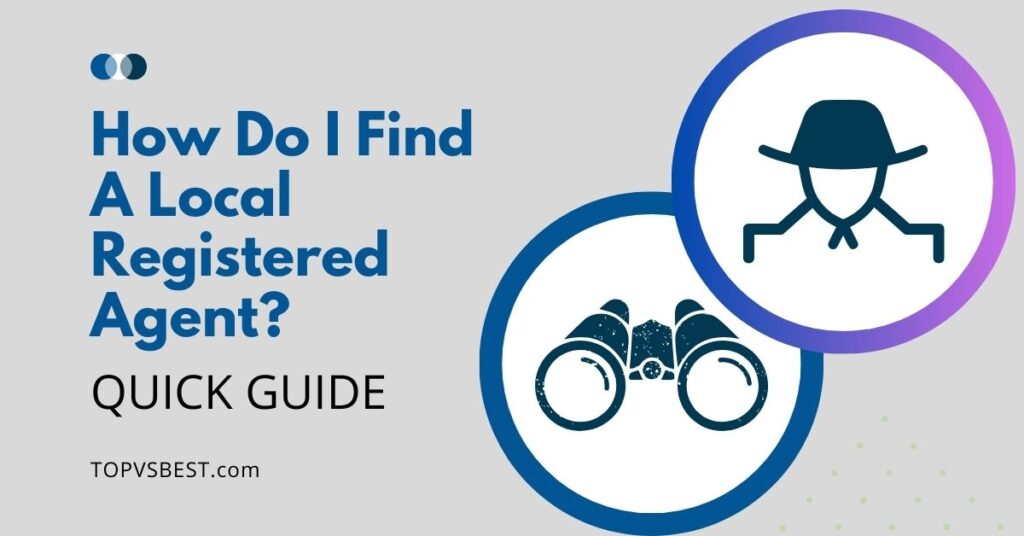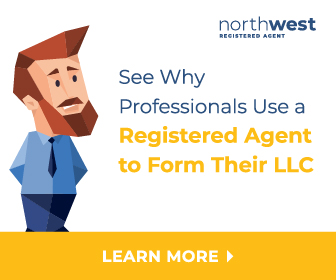Overview
When it comes to running a business, there are many legal responsibilities to consider, and one of them is having a registered agent.
In this blog post, we’ll help you find a local registered agent, explain what they are, why you might need one, and how to find the right one for your business.
What Is A Registered Agent?
A registered agent, also known as a statutory agent or resident agent, is a designated individual or entity responsible for receiving legal and official documents on behalf of a business entity, such as a corporation or LLC (Limited Liability Company).
These documents may include important legal notices, tax forms, and service of process, such as lawsuits or summons. The primary role of a registered agent is to ensure that the business entity is promptly notified of any legal actions or government correspondence.
They serve as the official point of contact between the business entity and the state government, helping to ensure that the entity stays informed about its legal obligations and any legal actions it may face.
In summary, a registered agent is a broad term that refers to the role of receiving legal documents on behalf of a business.
What Is A Local Registered Agent?
The terms “registered agent” and “local registered agent” are often used interchangeably, but they can have slightly different connotations depending on the context. Here’s an explanation:
A local registered agent is a subset of registered agents and is often used specifically in the context of an LLC (Limited Liability Company) or corporation.
A local registered agent is an individual or business entity designated to receive legal documents, official notices, and government correspondence on behalf of a company. This includes important documents such as tax notices, legal summons, and other official communication.
The key distinction is that a local registered agent is typically someone or a service located within the same state where the business is registered. This geographical proximity ensures that legal documents and official notices specific to the state’s regulations are received promptly.
So, while a registered agent is a broader term encompassing the role of receiving legal documents on behalf of a business, a local registered agent specifically refers to an agent located within the same state as the business entity.
The choice between a general registered agent and a local registered agent often depends on the business’s needs and the state’s regulations.
Why Use A Local Agent?
A local registered agent establishes a physical presence in the state, which may be required for legal matters and tax purposes.
It also ensures that important documents are promptly delivered to your business, allowing you to focus on your core operations while staying compliant with state laws.
Do I Need A Registered Agent?
Whether you need a registered agent depends on your business structure and your state’s requirements.
Different States’ Registered Agent Requirements
Most states mandate the appointment of a registered agent for LLCs and corporations. However, the rules for Registered Agents are similar across all 50 states.
In general, Registered Agents need to have a physical office in the state, be available during regular business hours (usually 9 a.m. to 5 p.m.), receive important official mail, and be at least 18 years old.
Your state’s Secretary of State website will have details about any additional requirements and duties of Registered Agents, along with access to forms and fee information.
When you initially register your business, you typically designate your Registered Agent in your Articles of Incorporation. If you need to change your agent later, you’ll need to use a different form and may incur a fee.
It’s essential to check your state’s specific regulations.
Can I Be My Own Registered Agent?
Yes, you can serve as your own registered agent in all states with some rules applied. Also, it requires a physical address where legal documents can be delivered.
In certain states, including Pennsylvania, business owners can act as their own registered agent for their LLC (Limited Liability Company) or corporation.
This means that you, as the business owner or a designated representative, take on the responsibilities of receiving legal documents and official notices on behalf of your business entity.
Requirements For Being Your Own Registered Agent
There are specific requirements and considerations you should be aware of if you choose to be your own registered agent:
- Physical Address: To serve as your own registered agent, you must have a physical street address within the state where your business is registered. P.O. boxes are generally not accepted as the registered agent’s address. This physical address is crucial because it ensures that legal documents and official notices can be delivered to a location where you can receive them during standard business hours.
- Availability: As your own registered agent, you must be available during regular business hours to accept legal documents. This availability ensures that important documents are received promptly and that your business can respond to legal matters in a timely manner.
- Privacy Considerations: Keep in mind that your registered agent’s address is a matter of public record. If you serve as your own registered agent, your home address may become publicly accessible, which can impact your privacy. Some business owners prefer to maintain their privacy by using a professional registered agent service instead.
Pros And Cons Of Being Your Own Registered Agent
Pros
Cons
In summary, while you can be your own registered agent, carefully considering the requirements and responsibilities associated with this role is essential.
Many business owners choose to use professional registered agent services to ensure the timely and secure receipt of important documents while preserving their privacy and flexibility.
Ultimately, the choice depends on your circumstances and business owner preferences.
How Much Does A Registered Agent Cost?
The cost of a registered agent varies based on factors such as your business’s location and your choice of agent.
- Professional Registered Agent Service: If you opt for a professional service, costs typically range from $50 to $300 or more per year. The exact price depends on the service provider and the additional features they offer to support your business. These services ensure the prompt delivery of legal documents.
- Being Your Own Registered Agent: If you’re eligible and willing to act as your own registered agent, it can often be done at no additional cost beyond state filing fees. However, this requires you to be available during business hours to receive legal documents.
- State-Specific Variations: The cost of a registered agent can also vary by state. Some states may have lower fees or different requirements.
- Additional Fees: Keep in mind that some registered agent services may charge extra fees for services like document forwarding or compliance monitoring.
For accurate cost information tailored to your situation, it’s best to check your state’s requirements and obtain quotes from different registered agent service providers. When deciding, consider the level of service and support that aligns with your business’s needs and budget.
How Do I Find A Local Registered Agent Online?
Finding a local registered agent online is easier than you might think. To find a local registered agent online, here are the steps to follow:
- State Government Website: To find a registered agent for an LLC, visit your state’s government website, such as the Pennsylvania Department of State. Look for the Commercial Registered Office Providers list or a similar resource.
- Specialized Companies: Look for companies like Northwest Registered Agent, Bizee , or ZenBusiness that offer registered agent services tailored specifically to LLCs and corporations in your state, such as Pennsylvania.
- Comparison and Reviews: Research on Google and other search engines for “registered agent near me.” Or check out resources like blogs on the internet that compare different registered agent services and read reviews. This will help you make an informed decision.
By following these steps and utilizing these sources and services, you can easily find a local registered agent online to meet your business needs, whether you’re in Pennsylvania or any other state.
Northwest Registered Agent
Companies like Northwest Registered Agent specialize in providing registered agent services for LLCs and corporations in various states.
FAQs
The rules vary by state, so check your state’s requirements. In Florida, you can usually be your own registered agent if you have a physical address there.
Yes, in Missouri, you can be your own registered agent if you have a physical address in the state.
Yes, Connecticut requires LLCs and corporations to have a registered agent.
Conclusion
A registered agent is a crucial part of your business’s compliance with state regulations and legal matters.
Whether you choose to be your own registered agent or hire a professional service, ensure you understand your state’s requirements and make an informed decision to protect your business’s good standing.
Choosing a local professional like Northwest Registered Agent or another company can make your life easier and help you focus on other, more crucial parts of your business.




